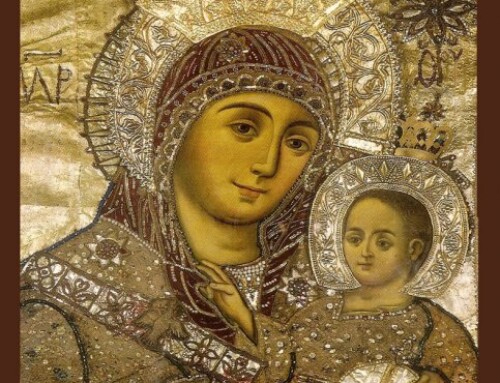Word Magazine April 1979 Page 5-6
CONFESSION AND THE BIBLE
by Antony Bassoline
During the Lenten season the Church puts special emphasis on the Sacrament of Penance. This time of year before the great Resurrection feast is especially suited for the “re-ordering” of our lives, and the reflecting on our sinful nature — a sort of internal house-cleaning. Attendance at Lenten services makes this call to penance obvious to us.
As much as the Sacrament of Penance is emphasized during Lent, so much do people resist it. Confession is often put off until the last minute; all sorts of excuses for not making confession at all are manufactured. In my years as a priest I have encountered numerous people who had a genuine fear and actual abhorrence of private confession to a priest. There are many people who would enthusiastically perform any penance and any degree of fasting in sorrow for past sins, but at the same time would try desperately to avoid having to confess their sins. The reaction is natural. Who enjoys humiliating himself in front of another human being? Who wants to divulge his most evil thoughts and actions to another?
Penance is truly the unpleasant sacrament. Yet it is a necessary medicine to the condition of our lives, and what medicine is ever pleasant?
Not only is the Sacrament of Penance unpopular; it is also in a terrible state of confusion. There exists, unfortunately, no uniformity in its practice in the Church. In some Orthodox parishes it is practically ignored, in other parishes confession is required before each reception of Holy Communion. In some places “general” confession is practiced; in other places the faithful can come and ask for absolution without ever having mentioned a single thing about their personal sins. The reasons for this confusion and lack of uniformity even in the understanding of the nature and function of this sacrament are complicated and to be treated properly would require a treatise much beyond the scope of this essay. Let us simply establish for now that the sacrament exists. The purpose of this article is to prove by Biblical evidence that the Sacrament of Penance was established directly by Jesus Christ; that it is not, therefore, a “man-made invention”; and that its function in the Church is not dispensable.
Human nature being what it is, we try to rationalize away those things we find unpleasant. So it is with the Sacrament of Penance. For centuries men have tried to minimize this sacrament, or even to do away with it entirely.
The Argument Against
The most commonly used argument against confession goes something like this: “I can confess directly to God; He knows my sins already. I don’t have to confess to another man. The practice of going to confession was invented by men.” This argument is heard widely among critics of the Orthodox Church. I once actually heard a minister of another faith make a public statement very similar to this! It is, unfortunately, also often heard within the Church. Of course, if we follow this argument to its logical (or rather, illogical) conclusion, we would have to say: “I don’t have to go to church, I can pray to God directly,” or, “I don’t have to be baptized, I can accept Jesus as my personal Savior in my heart,” etc., etc.
Anyone who makes the claim that there is no foundation for the practice of confession of sins before a priest in the Bible, reveals an abysmal ignorance of what is actually written in the Bible. Several statements of our Lord unmistakably and directly command the Apostles to forgive sins in His name and with His authority. Several statements of St. Paul are also extremely direct in this matter.
The most obvious statement of Christ in regard to the Sacrament of Penance is found in the Gospel of St. John. After His Resurrection, Jesus confers authority upon the Apostles and tells them: “Peace be with you. As the Father sent me, so I send you. . . .Receive the Holy Spirit. Whose sins you forgive, they are forgiven; whose sins you do not forgive, they are not forgiven.” (Jn 20:22-23) What could be more obvious than this statement? How anyone could say the Sacrament of Penance is man’s invention after reading this passage, would require some amazing verbal acrobatics! Note that the Apostles were commanded to forgive sins. How were they to forgive sins and judge which sins to forgive or not forgive, unless they know the sins? If a man’s sins were to be forgiven, they, therefore, had to first be revealed.
The Church’s Commission
Two passages in St. Matthew’s Gospel also are directly related to the Church’s commission to forgive sins. The first is the famous statement in reference to St. Peter. After calling Simon the “rock” upon which the Church would be built, Jesus goes on to say: “I will give you the keys of the Kingdom of heaven; what you bind on earth will be bound in heaven, and what you loose on earth will be loosed in heaven.” (Matt. 16:19) This same commission is later given to all the Apostles: “And so I tell all of you: What you bind on earth will be bound in heaven, and what you loose on earth will be loosed in heaven.” (Matt. 18:18) Of course, it is possible to argue that the binding and loosening can refer to any number of things and the connection with confession and forgiveness of sins does not seem to be so readily apparent to the modern reader. If we, however, take this statement of our Lord first to Peter, then to all the Apostles, in its original context, we see that it definitely refers to forgiveness of sins. The concept of binding and loosening must be understood as deriving from the Mosaic Law where it directly refers to a man being bound by and loosed from his sins. We find numerous examples of this in the book of Leviticus. The Hebrew priests had the right to declare a man loosed from his sin after he had been bound for that sin (that is: the priests had the duty to impose a ritual “penance” over a period of time to “bind” a man by his sin. When the “penance” was fulfilled, he was loosed by the priests from his fault). Jesus undoubtedly made the statement in this context. The Apostles, being Jewish, certainly understood the authority to bind and loose in the same Old Testament context. Since the whole of the eighteenth chapter of St. Matthew’s Gospel, from which this commission to the Apostles comes, deals with sinfulness and forgiveness, it is all the more reason to believe that the statement about binding and loosening has to do with the forgiveness of sins. It is, in fact, the commission to forgive the sins of men given in a way that the Jews would understand (remember that St. Matthew’s Gospel was written for a Jewish audience.)
Another passage from the same chapter of the same Gospel deserves to be mentioned here: “Where two or three are gathered together in my name, there I am in the midst of them.” (Matt. 18:20) On the popular level this statement of our Lord is almost universally believed to refer to prayer. While it is true that when two or more Christians are praying together, Jesus is spiritually with them, it is not the point of this passage in its context. Actually, Jesus is here talking about the Church having to judge a member who has sinned. The two or three are not gathered together for a prayer service, but to pronounce judgment on sins as witnesses for the Lord. Again we have to ask the question, how is the Church to pronounce judgment on sin unless the sin is revealed? The two or three witnesses became in actual practice one witness, a priest, who, while he is hearing confession and evaluating it, represents the entire Church.
St. Paul
The Epistles of St. Paul provide us with further evidence concerning the Church’s power to judge sins. The incident from the Church in Corinth is especially to be noted in this regard. In the fifth chapter of the First Epistle to the Corinthians St. Paul writes that he has heard of a case of incest in the Corinthian community. He goes on to say: “The man who has done such a thing should be expelled from your fellowship. And even though I am far away from you in body, still I am there with you in spirit; and as though I were there with you, I have in the name of our Lord Jesus already passed judgment on the man who has done this terrible thing. As you meet together, and I meet with you in my spirit, by the power of our Lord Jesus present with us, you are to hand this man over to Satan for his body to be destroyed, so that his spirit may be saved in the Day of the Lord.” (I Cor. 5:3-5) St. Paul is here actually pronouncing excommunication from the Church on the unrepentant sinner. Notice that he speaks of passing judgment in the name of Jesus. Isn’t this exactly what the priest is expected to do in the Sacrament of Penance; to pass judgment on the sin and on the sinner’s sincerity of repentance?
We also find in St. Paul’s writings the earliest statement of absolution by an Apostle. He says:
“When you forgive someone for what he has done, I forgive him too. For when I forgive — if, indeed, I need to forgive anything — I do it in Christ’s presence because of you, in order to keep Satan from getting the upper hand over us; for we know what his plans are.” (II Cor. 2:10-11) Paul pronounces forgiveness for the repentant sinner! It is possible then for a man to know the sins of another man and to pronounce forgiveness of these sins, if the sinner has shown signs of repentance.
When the priest of the Church hears confession, imposes penance and pronounces absolution, he does so with the authority of the Lord and in the name of the Lord and, as was hopefully demonstrated by this article, at the direct command of the Lord.
All of this is best summed up by the prayer of Absolution itself, which shows to us so eloquently that the priest in confession is a sinner as is the penitent, but because of his position brings the forgiveness of the Lord to those who truly repent.
My spiritual child, I, a humble man and also a sinner, do not have power in myself to forgive the sins of men on earth, but only through the divinely spoken words of our Lord, who said to His Apostles and disciples after His glorious resurrection, ‘Whose sins you forgive, they are forgiven them; whose sins you do not forgive, they are not forgiven.’ With this command in mind, we are bold to say: Whatever you have confessed here or failed to confess out of ignorance or forgetfulness, whatever these things may be, may Christ forgive you them all, both in this world and in His kingdom which is to come.
Father Antony Bassoline is pastor of St. George Church in Upper Darby, Pa.


